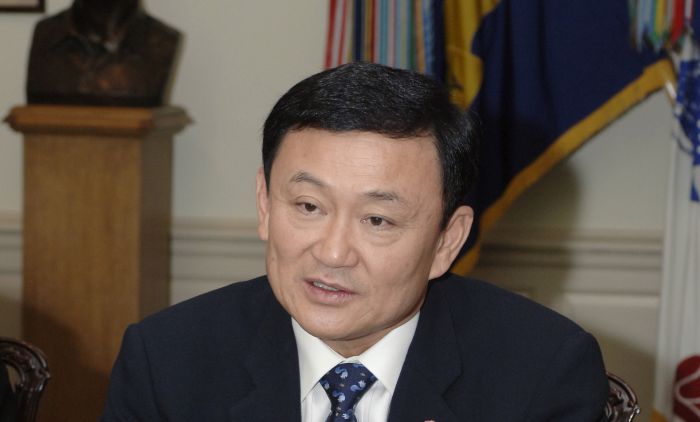The only viable option for resisting populist plutocrats is “to put the leader aside and look at how you can address their supporters,” says Thailand’s former prime minister.
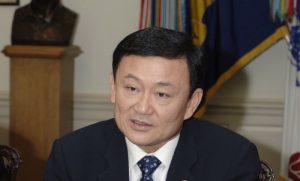
For much of the last two decades, Thaksin Shinawatra has haunted Thailand’s political system.
Thaksin, who served as Thailand’s prime minister between 2001 and 2006, was overthrown in a military coup and has since been living in self-imposed exile to avoid imprisonment for corruption. Yet he continues to wield significant influence over the country’s politics. His sister, Yingluck Shinawatra, became Thailand’s first female prime minister in 2011 thanks to her brother’s popularity, before she was overthrown herself by the military junta that controls Thailand and fled the country to avoid imprisonment. (She was convicted of negligence and sentenced to five years in prison in absentia last week.)
Despite Thailand’s unique circumstances and intricate politics, Thaksin bears many similarities to Western populist plutocrats such as Donald Trump and Silvio Berlusconi, said Abhisit Vejjajiva, the former prime minister of Thailand (2008-2011) and the leader of the country’s Democrat Party, during a panel at the Harvard Law School/Stigler Center conference on populist plutocrats last week. “Too often, we in politics and academia are obsessed with details. We think that the context and social economic environment in each country is different, and we fail to see the common trends and similarities between what’s been happening in our countries.”
The Thai version of Berlusconi and Trump
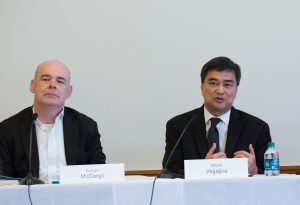
In addition to Abhisit, the panel discussion also included Duncan McCargo, a professor of political science at the University of Leeds and co-author of “The Thaksinization of Thailand” (Nordic Institute of Asian Studies, 2004), and moderator Alan Wirzbicki, a senior editorial writer at the Boston Globe.
Abhisit, who said he spent much of the last two decades in politics “fighting populist leaders, from Thaksin to his successors,” detailed three factors that contributed to Thaksin’s rise.
One was the 1997 Asian financial crisis, which led to “a backlash of resentment against the ruling class.” Though the previous government, headed by the Democrat Chuan Leekpai, steered the economy out of crisis, “the feeling was that although they may have done a good job from a technocratic point of view, they were isolated from the general public. That gave an opening for an outsider to come along and play on the nationalistic feelings and resentments against globalization.”
Another factor was Thailand’s “long history of rather messy and corrupt coalition governments,” which led many to develop “a very cynical view” of politics. It also led to the adoption of a new, more progressive constitution in 1997 that sought to stabilize the political system by granting the prime minister far-reaching executive authorities.
The third factor was Thaksin himself, the first politician to introduce “modern campaigning methods” into Thai politics, who managed to position himself as an outsider despite having been in politics for a number of years and filling his party with political veterans. Thaksin offered a range of welfare policies that appealed to Thailand’s disenfranchised rural populations.
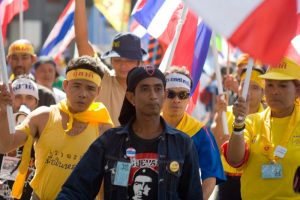
Thaksin, said McCargo, was initially seen as the leader that was going to break “the cycle of coups and protests and new constitutions,” but failed to do that. Nevertheless, he managed to remain an “incredibly dominant figure,” winning two elections (2001 and 2005), in addition to two elections won by his successors (2007 and 2011), and two elections, in 2006 and 2014, that were boycotted by the Democrats and later annulled by the courts.
“How was he able to do that?”
According to Abhisit, Thaksin was aided by his newfound executive authority, which he took advantage of to fulfill some of his campaign promises, creating the impression of an effective ruler. The 1997 constitution sought to check executive power by creating a network of independent monitoring bodies, but Thaksin was able to corrupt those, using his sway over Thailand’s senate to put his own people in charge. “He used his popularity to dismantle, used his money to bribe, and used his business influence to basically destroy all the checks and balances in the system,” said Abhisit. “As long as people were satisfied or impressed with what the government was doing, they didn’t mind.”
Thaksin’s takeover of the media, said Abhisit, didn’t trigger any widespread public resistance. Voters “didn’t mind or notice.” Some of his most egregious policies, such as his brutal “war on drugs”—which led to over 2,000 killings—and his suppression of the separatist insurgency in south Thailand, turned out to be immensely popular. “People felt this was no-nonsense style of government, getting things done,” explained Abhisit. “Drugs are a problem? Kill all the drug dealers. It didn’t matter that there was no due process, or that these people had not even been proven to be in the drug trade.”
Much like other populist plutocrats, Thaksin also used his office to enrich himself. “People felt he’s corrupt, but they also had this impression that all politicians are corrupt anyway, so it was better to have somebody who is corrupt but did something that benefited them, rather than being corrupt and not doing anything for them—again, very much like Berlusconi,” said Abhisit.
Thaksin was able to effectively neuter the opposition by branding his rivals enemies of the state. “Populist leaders are very quick to brand their opponents,” said Abhisit. Those who opposed Thaksin “were labeled part of the elitist establishment who wouldn’t let go of the power they had.” His brash style endeared him to many. “It created the impression that ‘he tells it like it is’ and has no time for political correctness,” added Abhisit. “All this will sound very familiar to Americans today.”

Thaksin, Abhisit acknowledged, did achieve some policy success. “His healthcare program was deemed a success. He inherited an economy that was about to take off—interest rates were low at the time—so people did enjoy strong economic growth. And he had grass roots policies that addressed people’s concerns—not in a sustainable way, but in a way that [fomented] approval for the job he was doing.” This made his supporters overlook his corruption, conflicts of interest, and the “systematic dismantling” of democratic institutions. It “played into the emotions of the majority who felt politics was not delivering.”
What can U.S. Democrats learn from the failure of Thailand’s opposition?
When it comes to defeating populist plutocrats, Thailand offers a cautionary tale. While the opposition (led by Abhisit and the Democrats) were able to briefly regain power in 2008, they failed to hold on to it and suffered a crushing defeat to Thaksin’s Pheu Thai Party (headed by Yingluck) at the 2011 elections. Despite his convictions, the removal of him and his party from political life, and the seizing of his assets, if elections were held today “there’s a very high chance that some pro-Thaksin figure would win again,” according to McCargo.
When it comes to defeating populist plutocrats, said Abhisit, “we only know what you shouldn’t do. Because everything that had been tried in Thailand and many other countries has not worked.”

What we do know, he said, is that demonization is a losing strategy that often backfires, as it did in Thailand. “The political opponents of Donald Trump are doing it all wrong,” said Abhisit. “They are still trying to attack him on his inconsistency, his vulgarity, his political incorrectness, none of which matters to his supporters. If anything, it reinforces his narrative that a certain group of elites are out to get him.”
Resorting to legal means “also just doesn’t work. Thaksin and his people have been found guilty of a number of corruption charges and abuses of power. But they [branded] the courts and the judiciary as another enemy of the people,” he added. “Every time there is an unfavorable verdict against Thaksin, the popularity of his party jumps.”
Coup d’etats, Abhisit clarified, also don’t work. “I can assure you of that.”
The only viable option for resisting plutocratic demagogues, he said, is “to put the leader aside and look at how you can address their supporters. Try to understand why they supported this kind of leader in the first place—that means identifying the deep-rooted sense of dissatisfaction or disillusionment from the political process. The only way to win them back is to make them understand that you are concerned with their problems—and show that you’ve got better solutions.”
Thailand’s opposition, said McCargo, is largely responsible for the hostility they encountered: They boycotted elections they didn’t expect to win and then encouraged the courts to annul their results; they benefited from the suppression of Thaksin and his political allies; main figures within the opposition backed the mass protests that instigated the military coup. “It’s difficult for the opposition party to say ‘actually we were really on your side, we weren’t using improper tactics,” he said.
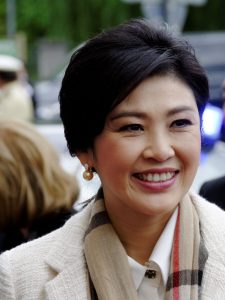
Ultimately, however, it’s a question of narratives. “To quote Thaksin, ‘If you want to be a good leader, you have to be a master of storytelling. You have to tell the public you are leading them to a better place, otherwise the resistance to change would be too much,’” said McCargo. “The problem is that pro-Thaksin politicians always had the best lines and the best stories.”
The Thai electorate has also been completely transformed by nearly two decades of political polarization, “where one side has a lot of the good stories and the other side has got itself in constant reaction mode, coming up with frankly unconvincing, patronizing sounding, non-empathetic responses which don’t really wash with much of the population—only their base in the capital and the south of Thailand.”
“In huge swaths of the north and northeast, where most of the voters are, people have a completely different sense of their identities from people in Bangkok. There’s a massive disconnect and polarization in the society. It’s not unique to Thailand. It’s something we’re seeing in many countries,” said McCargo. Coming up with a “good story” that counters these narratives is extremely difficult in a society where populist narratives had set in. “Once this kind of stories has been laid out, it’s really difficult to unravel them.”
Can America avoid repeating the mistakes of Thailand’s opposition? Both Abhisit and McCargo weren’t optimistic. “The American system hasn’t been put to the test as often as most of these southeast Asian countries, where political crises are more frequent,” said McCargo. “It’s all going into fairly new territory. But those of us who have been watching Southeast Asia will be somewhat alarmed.”
Disclaimer: The ProMarket blog is dedicated to discussing how competition tends to be subverted by special interests. The posts represent the opinions of their writers, not those of the University of Chicago, the Booth School of Business, or its faculty. For more information, please visit ProMarket Blog Policy.





